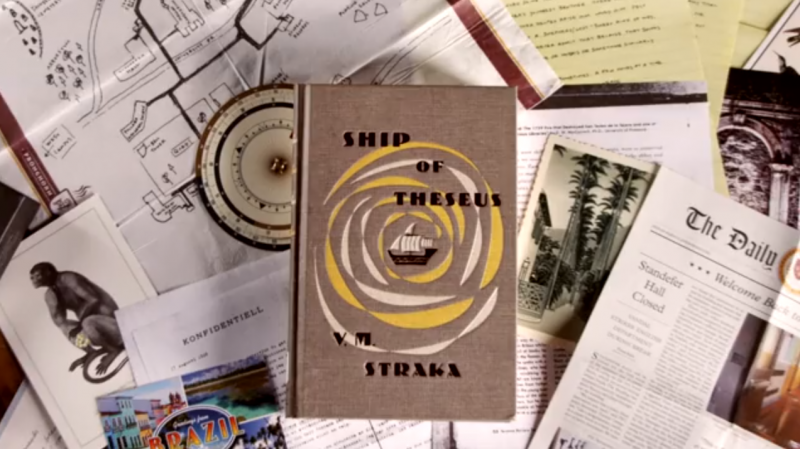Book Review: 'S.'

"S." conceived by J. J. Abrams and written by Doug Dorst is one of those books. It's absolutely stunning.
Several years previously, Abrams came across a used book while traveling, with a note inside telling the reader to read it and pass it on. The notion of two readers connecting through a book and sharing a literary experience stuck with him, and "S." is a homage to that experience.
On the back cover, "S." is described as "Abrams and Dorst's love letter to the written word," but it also acts as a love letter to books themselves and to traditional publishing in an increasingly digitized age.
Perhaps the most beautiful aspect of this book is that it could not function as an e-book; there are notes scrawled in the margins that beautifully mimic human handwriting, postcards and newspaper clippings tucked into the pages and a well-used look complete with slight ink smudges and yellowing pages that simply could not be replicated in a digital rendition.
Abrams, known for his work on "Lost," the "Star Trek" franchise and "Fringe," collaborated with novelist and writing instructor Dorst ("Alive in Necropolis," "The Surf Guru") to create this project, which harmonizes a fictional novel, the coded messages in said novel and two university students' attempts to make sense of it all.
The way these stories intertwine and affect one another form the heart of the project. The copy of "Ship of Theseus," published in 1949, serves as the focal point, with all the storylines revolving around this book's contents. Fans of Mark Z. Danielewski will appreciate this unconventional way of telling stories, as "S." pushes the boundaries on literary conventions as "House of Leaves" did, though each has its own distinct style.
Written by V. M. Straka, a fictional author whose true identity is unknown even to his closest friends, "Ship of Theseus" tells the story of a man known only as S. He has no past that he can remember, and he ends up becoming the primary passenger on a strange ship with an even stranger crew. His journey takes him through a tale of power, corruption and assassination. These themes echo what is known of Straka's own life, as he was a political dissident accused of a variety of highly influential crimes, including the murder of Archduke Franz Ferdinand. Even as a standalone novel, "Ship of Theseus" is an intriguing read, discussing major themes, a quest to find one's self and the human condition.
There is something different about this novel—it is both Straka's final novel and the only one with footnotes and a foreword. Though he has worked with his translator, F. X. Caldeira, several times before, this is the only Straka novel that includes a foreword and footnotes. Eric, a disgraced grad student and Straka scholar, doesn't understand their purpose and critiques them until Jen, a senior literature major, points out that the footnotes are written in code, hiding a desperate message from Caldeira to Straka.

Though it's quite implausible that two college students would communicate solely through margin notes, even with the justification that Eric doesn't trust electronics, this works in the context of this story. Both students are in dark places in their lives and obsessed with literature, especially "Ship of Theseus." They find comfort in the tradition of writing to one another—which is fitting, as tradition is a recurring theme in "Ship of Theseus." As their relationship evolves, the book acts as a scrapbook of their relationship, prompting them to continue writing in it.
Despite the limits of passed notes as a means of storytelling, Abrams and Dorst create realistic voices for Eric and Jen, and the progress of their relationship is both believable and well-documented. Both are somewhat lost, having each faced major upheaval in their lives, and through their note passing, they learn just how much they are willing to trust the other.
Reading this novel is almost like learning to read—well, relearning to read. It's initially a challenge to keep track of the margin notes and the progress of the novel without occasionally rereading some passages. In the style of "Lost," the margin narrative frequently flashes back and forward to reveal Eric and Jen's story. It's also a more academic way of reading a novel for pleasure, as Jen and Eric interpret the similarities between the novel and the theories surrounding Straka's life. It's a fascinating and thought-provoking way to read.
Though "S." is a dense book, reading it doesn't feel like work. The reader is pulled through the story as Jen and Eric piece together the mystery of Straka. Their notes are placed strategically throughout the novel, foreshadowing events and discoveries to come.
The additional material scattered throughout the novel's pages adds another dimension to Eric and Jen's story. Every once in a while, something will occur or a story will be told that won't fit in the margins. Staying true to their chosen form of communication, they include details such as a map drawn on a napkin—one that looks and feels like an actual napkin or a note on university stationary detailing a childhood trauma.
No one aspect of "S." overpowers the others; the reader remains equally invested in Jen and Eric's lives, S.'s experiences in "Ship of Theseus," and the exposition of the Straka mystery. The three simultaneously unfolding stories add to "S." and create a richer narrative experience.
Crafted in extraordinary detail and demonstrating the power that the written word can have, "S." is a monumental work, demonstrating that there remains a place for physical novels in a digital age. It's certainly worth reading: it combines mystery, literary analysis, innovation, tradition, adventure and love in an exquisite package.
Reach Staff Reporter Jennifer Kuan here, and follow her on Twitter here.



